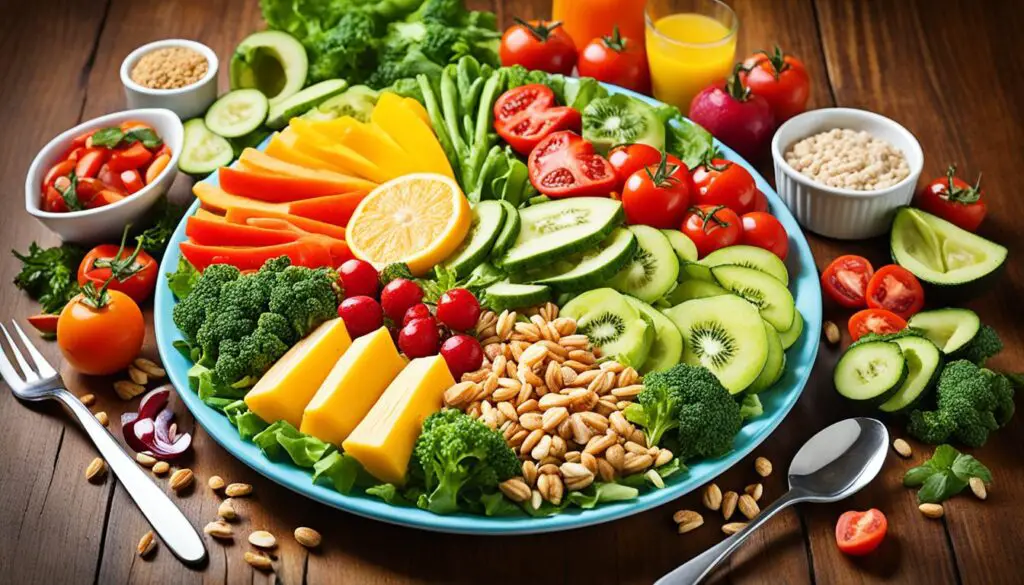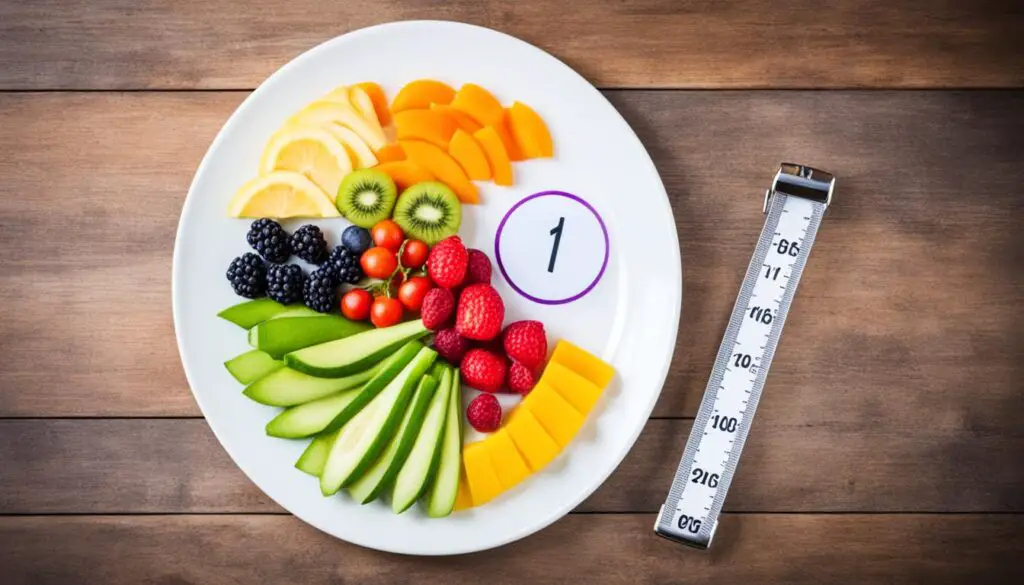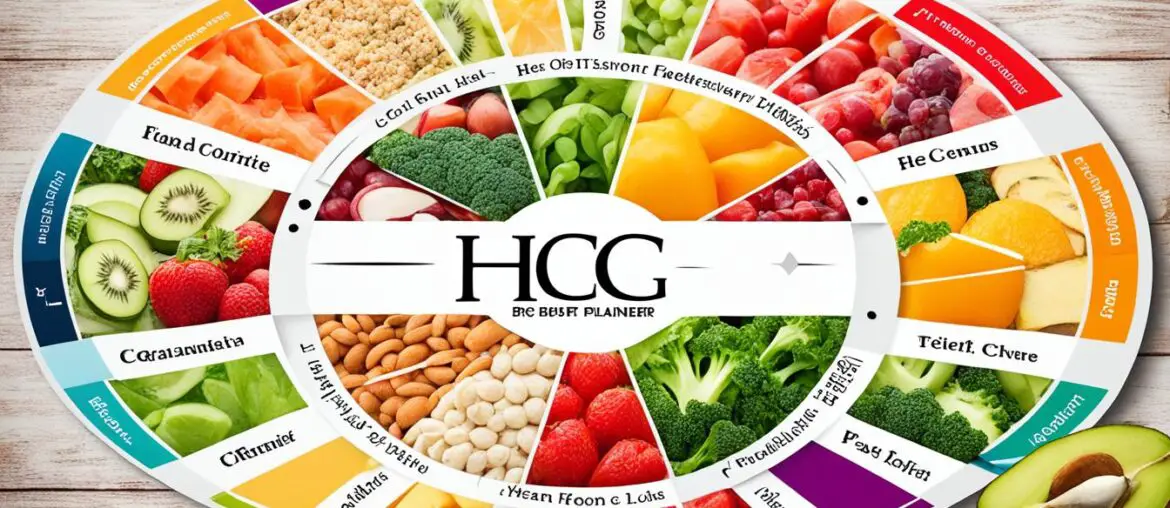Are you considering the HCG diet for long-term weight loss? Before you commit to this controversial weight loss plan, it’s crucial to understand the potential risks, benefits, and the importance of sustainable meal planning.
The HCG diet gained popularity for its promise of rapid weight loss, but does it really deliver long-term results? In this article, I will delve into the intricacies of long-term meal planning for the HCG diet and explore whether it is a viable option for sustainable weight loss.
We’ll discuss the various phases of the HCG diet, explore the meal guidelines and restrictions, and provide helpful tips for successful meal planning on this extreme diet. Furthermore, I will highlight the potential risks and side effects associated with the HCG diet and present alternative, healthier weight loss options.
Discover the truth behind the HCG diet and uncover the secrets to long-term weight loss success. Are you ready to separate fact from fiction?
Key Takeaways:
- Long-term meal planning for the HCG diet is essential for sustainable weight loss.
- The HCG diet is a controversial and unsafe weight loss plan that combines extreme calorie restriction with HCG supplements or injections.
- Consulting with a healthcare provider or registered dietitian is crucial before starting any weight loss plan, especially the HCG diet.
- There are many alternative, healthier weight loss options available that prioritize long-term habits and overall well-being.
- Focus on developing healthy eating habits and a balanced lifestyle to achieve and maintain long-term weight loss.
What is the HCG Diet?
The HCG diet is a short-term eating plan that aims to help individuals lose significant weight within a period of three to six weeks. It involves the combination of HCG supplements or injections with a highly restricted calorie intake. The goal is to achieve rapid weight loss through extreme calorie reduction. However, it’s important to note that the safety and effectiveness of the HCG diet have been called into question.
The U.S. Food and Drug Administration (FDA) has issued a warning about the safety and fraudulent claims surrounding HCG products for weight loss. Many experts in the field agree that any weight loss experienced while on the HCG diet is primarily due to the severe calorie restriction, rather than the effects of the HCG hormone itself.
While the HCG diet may initially result in weight loss, the long-term sustainability and safety of this approach have been widely debated. It is crucial to approach any weight loss plan with caution and to prioritize health and well-being. Consulting with a healthcare provider or registered dietitian is essential before starting any diet that involves HCG supplements, injections, or extreme caloric restriction.
Phases of the HCG Diet
The HCG diet is divided into three key phases: the loading phase, weight loss phase, and maintenance phase. Each phase serves a distinct purpose and plays a crucial role in the overall success of the diet plan.
Loading Phase
The first phase of the HCG diet is the loading phase, which typically lasts for two days. During this phase, individuals are encouraged to consume high-fat, high-calorie foods while starting HCG hormone supplementation. The purpose of this phase is to prepare the body for the calorie-restricted weight loss phase ahead. By consuming excess calories, the body’s fat stores are replenished, allowing for a smoother transition into the subsequent phase.
Weight Loss Phase
Following the loading phase, the weight loss phase begins. This phase involves consuming either 500 or 800 calories per day, spread over two meals. The duration of this phase varies depending on an individual’s weight loss goals. However, it generally ranges from three to six weeks. The calorie restriction during this phase, coupled with the effects of the HCG hormone, helps to facilitate rapid weight loss. It’s important to adhere to the recommended calorie intake and meal frequency to maximize the diet’s effectiveness.
Maintenance Phase
The final phase of the HCG diet is the maintenance phase. In this phase, the calorie intake is gradually increased, and HCG supplementation is discontinued. The purpose of the maintenance phase is to stabilize the new weight achieved during the weight loss phase. By gradually reintroducing additional calories and transitioning to a more balanced eating pattern, the body adjusts to its new weight and helps prevent weight regain. This phase typically lasts for three weeks, but the duration may vary based on individual circumstances.
It is important to follow each phase of the HCG diet diligently and under the guidance of a healthcare provider or registered dietitian. The careful progression through these phases ensures the best results while minimizing potential risks and side effects.
Meal Guidelines on the HCG Diet

When following the HCG diet, it is essential to adhere to specific meal guidelines to promote weight loss and ensure compliance. The HCG diet restricts food choices and calorie intake, emphasizing lean proteins, approved vegetables, and limited fruits. It is important to be aware of the allowed foods and the ones to avoid. Here are the meal guidelines for the HCG diet:
Allowed Foods:
- Lean proteins such as chicken, fish, and beef
- Specific approved vegetables
- Limited amounts of fruits
- Certain seasonings, coffee, tea, and water
Foods to Avoid:
- Dairy products
- Grains
- Fats and oils
- High-carb foods
- Sweets and desserts
It is crucial to note that the HCG diet recommends consuming either 500 or 800 calories per day, dividing them between two meals. Following these meal guidelines can help support weight loss while still providing essential nutrients for the body.
For a better understanding, here’s a breakdown of the allowed and restricted foods on the HCG diet:
| Allowed Foods | Restricted Foods |
|---|---|
|
|
By following these meal guidelines and incorporating a variety of allowed foods, individuals can create satisfying meals while on the HCG diet. It is important to note that adherence to the meal guidelines is essential for achieving optimal results and supporting overall health during the HCG diet.
HCG Diet Meal Planning Tips
Planning meals on the HCG diet is crucial for ensuring compliance and success. By following these meal planning tips, you can make the most out of your HCG diet journey.
Prepare Food Ahead of Time
One of the keys to successful HCG diet meal planning is preparing food ahead of time. By prepping your meals in advance, you can save time and avoid making impulsive food choices. Dedicate a specific day of the week to prepare your meals for the upcoming days. This can involve chopping vegetables, marinating proteins, and portioning out snacks.
Cook in Bulk
Cooking in bulk is a great strategy for HCG diet meal planning. Prepare large batches of HCG-approved recipes and portion them out into individual servings. This will not only save you time but also ensure that you have readily available meals throughout the week. Cooking in bulk can also be cost-effective as you can take advantage of sales or discounts when purchasing ingredients.
Freeze Meals for Convenience
Freezing meals is another HCG diet meal planning tip that can enhance convenience. If you’re cooking in bulk, consider freezing some of the portions for later use. Freezing meals allows you to have a variety of options on hand, making it easier to stick to the diet plan. Just make sure to label and date your frozen meals for easy identification.
Add Flavor with Spices and Herbs
While the HCG diet restricts certain food groups, you can still add flavor to your meals using spices and herbs. Experiment with different combinations to enhance the taste of HCG-approved foods. Some popular options include garlic powder, onion powder, paprika, cayenne pepper, and various fresh or dried herbs. Adding flavor to your meals can make the HCG diet more enjoyable and sustainable.
Grill Lean Proteins and Incorporate Substitutes
Grilling lean proteins is a tasty way to add variety to your HCG diet meals. Choose proteins such as chicken, fish, or lean cuts of beef and grill them to perfection. The smoky flavor from grilling can elevate the taste of your meals. Additionally, consider incorporating substitutes like eggs or cottage cheese for added variety and nutritional value.
Avoid Eating Out at Restaurants
When following the HCG diet, it’s best to avoid eating out at restaurants. The limited food choices and specific calorie restrictions can make it challenging to find suitable options. By preparing your meals at home, you have full control over the ingredients and portion sizes. This ensures that you stay on track and comply with the HCG diet meal guidelines.
Did You Know?
Planning meals on the HCG diet can help you stay organized and committed to your weight loss goals. By dedicating time to meal prepping, you can ensure that you have suitable meals readily available, reducing the risk of making unhealthy food choices.
By following these HCG diet meal planning tips, you can create delicious and satisfying meals while staying on track with your weight loss journey.
| Meal Planning Tips | Benefits |
|---|---|
| Prepare food ahead of time | Save time and avoid impulsive food choices |
| Cook in bulk | Save time and money |
| Freeze meals for convenience | Have a variety of options on hand |
| Add flavor with spices and herbs | Make meals more enjoyable |
| Grill lean proteins and incorporate substitutes | Add variety and nutritional value |
Making Long-Term Weight Loss Sustainable
While the HCG diet may result in rapid weight loss, it is not a sustainable or healthy approach to long-term weight management. To achieve and maintain long-term weight loss, it is important to focus on developing healthy eating habits and a balanced lifestyle. This includes consuming a variety of nutrient-dense foods, practicing portion control, staying physically active, managing stress, and getting adequate sleep. Working with a registered dietitian or healthcare provider can provide personalized guidance and support in achieving long-term weight loss goals.
Developing Healthy Eating Habits
Developing healthy eating habits is essential for long-term weight loss success. It involves choosing whole, unprocessed foods that are rich in nutrients and fiber. Incorporating a variety of fruits, vegetables, lean proteins, whole grains, and healthy fats into your daily diet can provide the necessary nutritional balance for sustained weight loss. It is important to avoid fad diets or extreme eating patterns that promise quick results but are difficult to maintain in the long run.
Practicing Portion Control
Practicing portion control is crucial for maintaining a healthy weight. It involves being mindful of the quantity of food we consume and listening to our body’s hunger and fullness cues. Portion control can be achieved by using smaller plates, measuring food portions, and being aware of serving sizes. By practicing portion control, we can prevent overeating and ensure a balanced intake of calories and essential nutrients.
Staying Physically Active
Regular physical activity plays a vital role in maintaining long-term weight loss. Engaging in aerobic exercise, strength training, and other forms of physical activity can help burn calories, build lean muscle mass, and improve overall fitness levels. It is essential to find activities that you enjoy and make exercise a regular part of your routine. Aim for at least 150 minutes of moderate-intensity exercise or 75 minutes of vigorous-intensity exercise per week.
Managing Stress
Effective stress management is important for maintaining a healthy weight. Stress can lead to emotional eating and poor food choices, which can hinder your weight loss efforts. Incorporating stress-reducing activities such as meditation, yoga, deep breathing exercises, or engaging in hobbies can help manage stress levels and prevent emotional eating. It is also important to prioritize self-care and make time for activities that bring you joy and relaxation.
Getting Adequate Sleep
Getting enough sleep is often overlooked but is crucial for weight management. Lack of sleep can disrupt hunger and fullness hormones, leading to increased appetite and cravings for high-calorie foods. Aim for 7-9 hours of quality sleep per night to support optimal weight loss and overall well-being. Establishing a regular sleep schedule, creating a relaxing bedtime routine, and creating a comfortable sleep environment can contribute to better sleep quality.
“To achieve long-term weight loss, focus on nourishing your body with healthy foods, practicing portion control, staying active, managing stress, and getting enough sleep.” – Registered Dietitian
In conclusion, sustainable weight loss is achieved through the adoption of healthy eating habits and a balanced lifestyle. While the HCG diet may offer rapid weight loss, it is not a sustainable or healthy long-term solution. By prioritizing nutrient-dense foods, practicing portion control, staying physically active, managing stress, and getting adequate sleep, we can achieve and maintain our weight loss goals in a healthy and sustainable way.
The Importance of Professional Guidance

Before embarking on any weight loss plan, especially the HCG diet, it is crucial to seek professional guidance to ensure the safety and effectiveness of your chosen approach. Consulting with a healthcare provider or a registered dietitian can provide invaluable support throughout your weight loss journey, helping you make informed decisions tailored to your individual needs and health conditions.
Professional guidance for weight loss is essential for several reasons. Firstly, healthcare providers and registered dietitians possess the knowledge and expertise necessary to evaluate your health status and identify any potential risks or contraindications that may affect your ability to engage in certain diet plans.
By consulting a healthcare provider, you can receive personalized advice based on your specific circumstances. They can help you develop a comprehensive weight loss plan that takes into account your medical history, current medications, and any underlying health conditions you may have. This personalized approach ensures that your weight loss journey is safe, effective, and tailored to your individual needs.
A registered dietitian for weight loss can provide expert guidance on nutrition and meal planning, helping you navigate the complexities of the HCG diet or other weight loss plans. They can assess your dietary requirements, educate you on portion sizes and macronutrient distribution, and offer strategies to address any potential nutrient deficiencies that may arise from following a restrictive eating plan.
Seeking professional guidance is especially crucial for individuals with underlying health conditions or those who require additional support during their weight loss journey. Healthcare providers and registered dietitians can closely monitor your progress, make necessary adjustments to your plan, and provide guidance and motivation along the way.
Remember, the HCG diet and other weight loss plans should not be undertaken without the supervision and support of a healthcare professional or a registered dietitian. Their expertise will ensure that your weight loss journey is safe, sustainable, and successful.
The Benefits of Professional Guidance
When you consult a healthcare provider or a registered dietitian for weight loss, you gain access to a range of benefits:
- Expert evaluation of your health status and individualized guidance
- Personalized advice based on your medical history and health conditions
- Nutrition and meal planning support tailored to your dietary requirements
- Monitoring of your progress, adjustments to your plan, and continued guidance
- Education on portion sizes, macronutrient distribution, and proper nutrition
- Motivation and support during your weight loss journey
By seeking professional guidance, you can optimize your chances of achieving your weight loss goals while minimizing the risks associated with fad diets or unstructured weight loss plans.
Potential Risks and Side Effects of the HCG Diet
The HCG diet is widely regarded as unsafe and unhealthy by health experts, mainly due to the various risks and side effects associated with it. It is crucial to be aware of these potential dangers before considering the HCG diet.
1. Nutrient Deficiencies:
The severe calorie restriction involved in the HCG diet can lead to significant nutrient deficiencies. When your calorie intake is limited to 500 or 800 calories per day, it becomes challenging to obtain all the essential vitamins, minerals, and macronutrients necessary for optimal health.
This puts you at risk of deficiencies in key nutrients like protein, carbohydrates, fats, vitamins, and minerals. These deficiencies can cause fatigue, weakness, hair loss, compromised immune function, and other health problems in the long run.
2. Muscle Loss:
The restricted calorie intake on the HCG diet can also result in muscle loss. When you consume significantly fewer calories than your body needs, it starts breaking down muscle tissue for energy. This can lead to a decrease in muscle mass and a slower metabolic rate, making it more difficult for you to maintain weight loss in the future.
3. Potential Rebound Weight Gain:
Due to the extreme calorie restriction and muscle loss associated with the HCG diet, there is a high likelihood of experiencing rebound weight gain. Once you resume a normal calorie intake, your body may store extra calories as fat, resulting in weight regain.
4. Side Effects:
Severely restricting calories for an extended period can also lead to various side effects. These can include fatigue, dizziness, headaches, irritability, constipation, and menstrual irregularities in women. These side effects can significantly impact your well-being and daily functioning.
5. Legal Issues:
Using HCG supplements or injections for weight loss is illegal, as they are only approved for treating female infertility. It is important to understand that the use of HCG for weight loss purposes is not authorized or regulated by the FDA.
It is essential to prioritize your safety and well-being by choosing weight loss methods that are scientifically supported, sustainable, and approved by healthcare professionals.
Alternatives to the HCG Diet

When it comes to weight loss, there are numerous alternatives to the HCG diet that offer safer and more sustainable options. These alternatives prioritize long-term habits and changes that promote overall health and well-being.
- Balanced and Portion-Controlled Meal Plans: Creating a balanced meal plan that includes all the necessary nutrients and portion control can help individuals achieve their weight loss goals. By focusing on a variety of whole foods, lean proteins, fruits, vegetables, and whole grains, individuals can create a sustainable eating plan that promotes weight loss while maintaining overall health.
- Regular Physical Activity: Incorporating regular physical activity into a weight loss journey is essential. Engaging in activities like aerobic exercises, strength training, and low-impact exercises not only aids in weight loss but also promotes cardiovascular health and overall fitness.
- Behavior Modification Techniques: Adopting behavior modification techniques can be an effective way to achieve long-term weight loss. These techniques focus on changing unhealthy habits and replacing them with healthier ones. Strategies like goal setting, self-monitoring, and positive reinforcement can help individuals build new, sustainable habits.
- Counseling Support: Seeking counseling support can provide individuals with the necessary tools and guidance for successful weight loss. Counseling can help address underlying emotional and psychological factors that contribute to weight gain and develop strategies for overcoming these challenges.
Working with a registered dietitian or healthcare provider is crucial in identifying the most suitable alternatives based on individual goals, preferences, and lifestyle. They can provide personalized advice and support, helping individuals navigate their weight loss journey with confidence and achieve long-term success.
The HCG Diet and Weight Loss Success
While some individuals may experience initial weight loss on the HCG diet, there is no substantial evidence to support its long-term effectiveness. Most weight loss achieved on the HCG diet is due to extreme calorie restriction, not the HCG hormone itself. The restrictive nature of the diet can also make it difficult to sustain weight loss in the long run. It is important to consider the potential risks and drawbacks of the HCG diet before attempting it and to explore alternative weight loss options that prioritize health and sustainability.
The HCG diet has gained attention for its promises of rapid weight loss. Proponents claim that the HCG hormone, when combined with a low-calorie diet, can lead to significant weight loss and help individuals achieve their desired body shape.
However, the effectiveness of the HCG diet in promoting long-term weight loss is questionable. While some people may experience initial success on this diet, it is primarily due to the severe calorie restriction rather than the HCG hormone itself. The extreme nature of the diet, which limits daily caloric intake to 500 to 800 calories, can lead to rapid weight loss in the short term. However, this drastic reduction in calories is not sustainable or healthy for long-term weight management.
Studies have shown that low-calorie diets, such as the HCG diet, can result in muscle loss and a decrease in metabolism. This can make it harder for individuals to maintain their weight loss once they resume a regular eating pattern. Additionally, the HCG diet’s highly restrictive food choices and limited calorie intake can be challenging to adhere to in the long term, leading to feelings of deprivation and increased risk of binge eating or yo-yo dieting.
It is essential to consider the potential risks and drawbacks of the HCG diet before embarking on this weight loss plan. The HCG hormone is not approved by the FDA for weight loss, and using it for this purpose is considered unsafe and illegal. Consulting with a healthcare provider or registered dietitian is crucial to ensure that any weight loss plan is safe and suitable for individual needs and health conditions.
Exploring alternative weight loss options that prioritize health and sustainability is recommended. Instead of resorting to extreme calorie restriction, focusing on balanced meal plans, portion control, regular physical activity, and behavior modification techniques can lead to long-term weight loss success. Working with a registered dietitian or healthcare provider can provide personalized guidance and support in achieving sustainable weight loss goals.
In conclusion, while the HCG diet may offer initial weight loss results, its long-term effectiveness remains questionable. Extreme calorie restriction and the potential risks associated with the use of HCG hormone make this diet unsustainable and potentially harmful. Prioritizing health, seeking professional guidance, and exploring alternative weight loss options that promote sustainable habits and overall well-being are crucial for achieving long-term weight loss success.
Conclusion
After evaluating the HCG diet, it is clear that this weight loss plan is not only controversial but also unsafe. While some individuals may experience rapid initial weight loss, there is no substantial evidence to support its long-term effectiveness or safety. Extreme calorie restriction and the use of HCG supplements or injections can lead to nutrient deficiencies, muscle loss, and potential rebound weight gain. It is crucial to prioritize health and seek professional guidance from a healthcare provider or registered dietitian before embarking on any weight loss journey.
When it comes to sustainable and healthy weight loss, there are plenty of alternative options available. By focusing on developing healthy eating habits, practicing portion control, staying physically active, managing stress, and getting adequate sleep, one can achieve long-term weight loss success. Working with a registered dietitian or healthcare provider can provide personalized guidance and support in creating a balanced meal plan that promotes overall well-being.
In conclusion, success in weight loss ultimately comes from making lifestyle changes and adopting healthy habits rather than following restrictive and potentially harmful diets like the HCG diet. Prioritizing health, seeking professional guidance, and exploring alternative weight loss options are crucial steps towards achieving sustainable and long-lasting results.
FAQ
What is the HCG Diet?
The HCG diet is a weight loss plan that combines HCG supplements or hormone injections with an extremely low-calorie diet. It is a controversial and potentially unsafe approach to weight loss.
What are the phases of the HCG Diet?
The HCG diet is divided into three phases: the loading phase, the weight loss phase, and the maintenance phase.
What are the meal guidelines on the HCG Diet?
The HCG diet restricts food choices and calorie intake, allowing specific foods in limited quantities. It is important to follow the guidelines strictly.
What are some HCG diet meal planning tips?
Some tips for meal planning on the HCG diet include preparing food ahead of time, cooking in bulk, and using spices and herbs for flavor.
How can I make long-term weight loss sustainable?
Long-term weight loss can be achieved by developing healthy eating habits, staying physically active, managing stress, and getting adequate sleep.
Why is professional guidance important for weight loss?
It is important to seek professional guidance from healthcare providers or registered dietitians before starting any weight loss plan to ensure safety and effectiveness.
What are the potential risks and side effects of the HCG Diet?
The HCG diet can lead to nutrient deficiencies, muscle loss, rebound weight gain, and side effects such as fatigue and dizziness.
What are some alternatives to the HCG Diet?
There are many alternative weight loss options available that are safer and more sustainable than the HCG diet, such as balanced meal plans and regular physical activity.
Is the HCG Diet effective for long-term weight loss?
There is no substantial evidence to support the long-term effectiveness of the HCG diet. Sustainable weight loss requires adopting healthy habits and lifestyle changes.
What are the key takeaways about the HCG Diet?
The HCG diet is a controversial and potentially unsafe weight loss plan that should be avoided. Prioritize health, consult professionals, and explore sustainable weight loss options.




